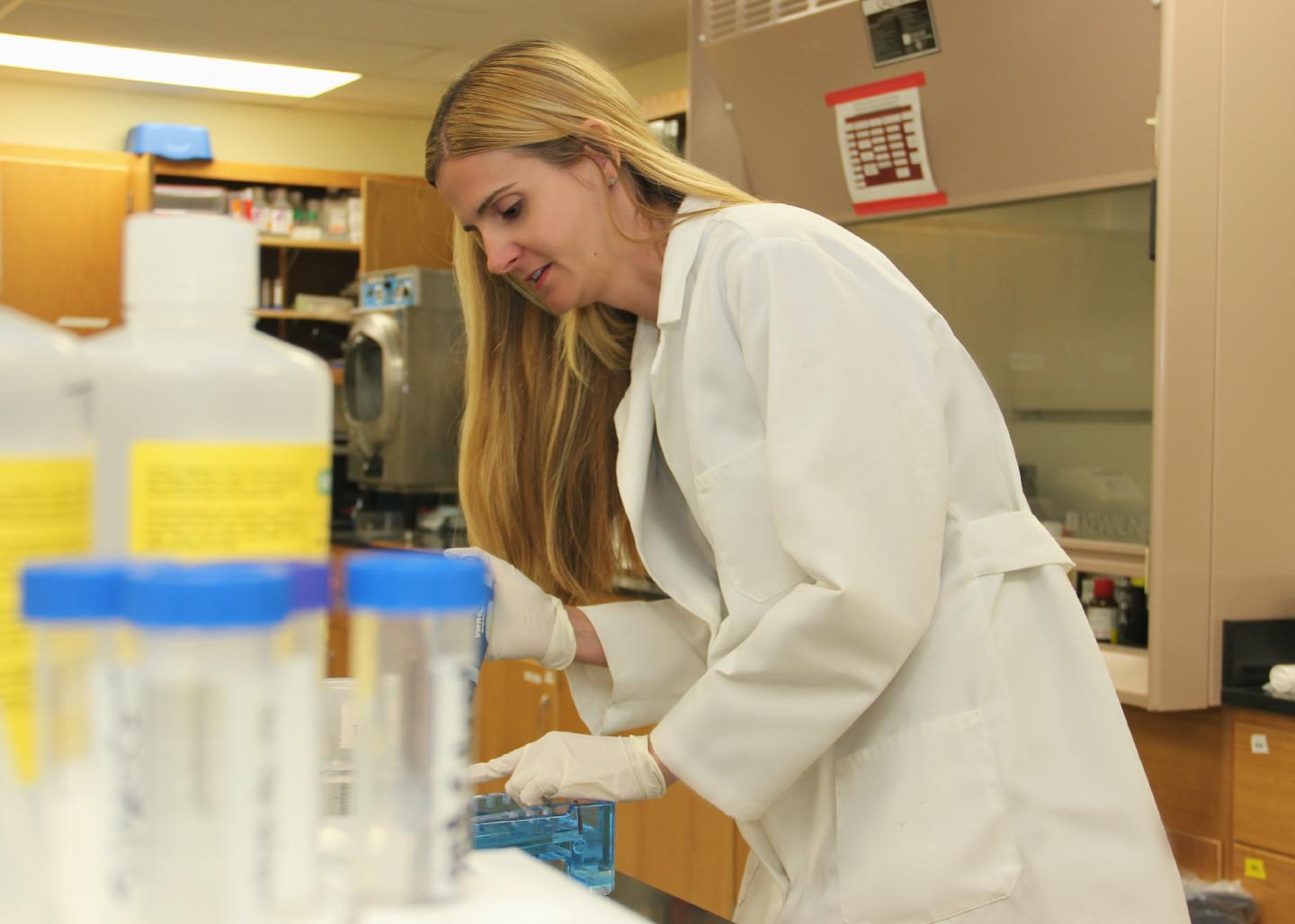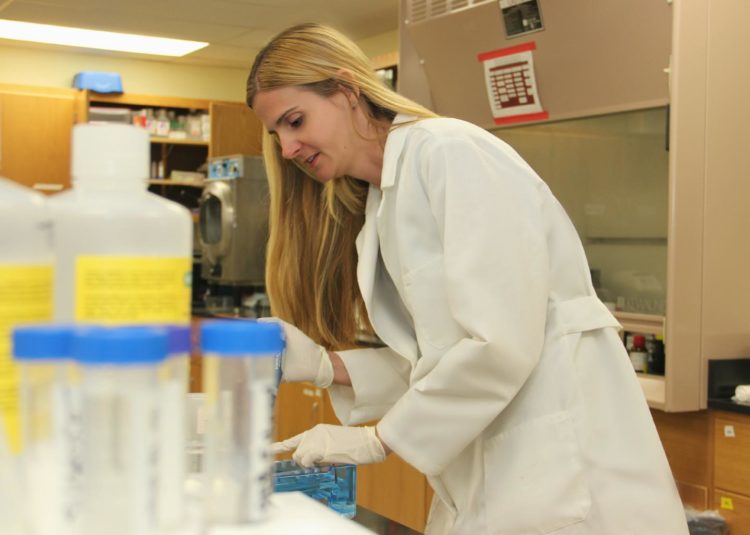NSU study shows that your gut microbiome and quality sleep are interconnected

Credit: Nova Southeastern University
FORT LAUDERDALE/DAVIE, Fla. – As if you didn’t already have enough to worry about to keep you up at night, a new study indicates that poor sleep can negatively affect your gut microbiome, which can, in turn, lead to additional health issues.
Great.
That’s at the heart – or gut – of the study just published in PLoS ONE that involved several researchers from Nova Southeastern University (NSU.) They wanted to see just how much of a connection there is between what is going on in our insides and how that may impact the quality of sleep we experience.
“Given the strong gut-brain bidirectional communication they likely influence each other,” said Jaime Tartar, Ph.D., a professor and research director in NSU’s College of Psychology who was part of the research team. “Based on previous reports, we think that poor sleep probably exerts a strong negative effect on gut health/microbiome diversity.”
What you may be asking yourself right now is: “what in the world is a gut microbiome?” Simply put – it’s all the microorganisms (bacteria, viruses, protozoa and fungi) and their genetic material found in your gastrointestinal (GI) tract. And yes, we all have these in our GI tract, but not all at the same levels (diversity.) As it turns out, it’s this diversity that could be the key.
For this study, subjects wore what Tartar called an “Apple Watch on steroids” to bed, which monitored all sorts of vitals. This way the researchers could determine just how well a night’s sleep the subjects got, and then they tested the subjects’ gut microbiome. What they found was those who slept well had a more diverse – or “better” – gut microbiome.
Tartar said that gut microbiome diversity, or lack thereof, is associated with other health issues, such as Parkinson’s disease and autoimmune diseases, as well as psychological health (anxiety and depression.) The more diverse someone’s gut microbiome is, the likelihood is they will have better overall health.
“We know that sleep is pretty much the ‘Swiss Army Knife of health,” Tartar said. “Getting a good night’s sleep can lead to improved health, and a lack of sleep can have detrimental effects. We’ve all seen the reports that show not getting proper sleep can lead to short term (stress, psychosocial issues) and long-term (cardiovascular disease, cancer) health problems. We know that the deepest stages of sleep is when the brain ‘takes out the trash’ since the brain and gut communicate with each other. Quality sleep impacts so many other facets of human health.”
Tartar’s area of research focuses on the mechanisms and consequences of acute and chronic stress in humans and the impact of normal sleep and sleep deprivation on emotion processing and physiological functioning.
So what determines someone’s gut microbiome? According to Robert Smith, Ph.D., an associate professor and research scientist at Nova Southeastern University (NSU) Halmos College of Natural Sciences and Oceanography, who is also a member of the research team, there are a couple of factors that come into play.
One is genetics – some people are predisposed at a genetic level to have a more diverse gut microbiome than their friends and neighbors. Another factor is drugs – certain medications, including antibiotics, can have an impact on the diversity of your gut microbiome. He also said that your diet plays a factor as well.
Smith said that their team, which included colleagues from Middle Tennessee State University, examined the association between sleep, the immune system and measures of cognition and emotion. He said understanding how these parts of human physiology work may lead to a better understanding of the “two-way communication” between the person and their gut microbiome, and could lead to novel sleep intervention strategies.
“The preliminary results are promising, but there’s still more to learn,” Smith said. “But eventually people may be able to take steps to manipulate their gut microbiome in order to help them get a good night’s sleep.”
###
Be sure to sign up for NSU’s RSS feed so you don’t miss any of our news releases, guest editorials and other announcements. Please sign up (https:/
About Nova Southeastern University (NSU): At NSU, students don’t just get an education, they get the competitive edge they need for real careers, real contributions and real life. A dynamic, private research university, NSU is providing high-quality educational and research programs at the undergraduate, graduate, and professional degree levels. Established in 1964, the university includes 16 colleges, the 215,000-square-foot Center for Collaborative Research, a private JK-12 grade school, the Mailman Segal Center (early childhood education) with specialists in Autism, the world-class NSU Art Museum Fort Lauderdale, and the Alvin Sherman Library, Research and Information Technology Center, one of Florida’s largest public libraries. NSU students learn at our campuses in Fort Lauderdale, Fort Myers, Jacksonville, Miami, Miramar, Orlando, Palm Beach, and Tampa, Florida, as well as San Juan, Puerto Rico, and online globally. Classified as having “high research activity” by the Carnegie Foundation for the Advancement of Teaching, NSU is one of only 50 universities nationwide to also be awarded Carnegie’s Community Engagement Classification, and is also the largest private institution in the United States that meets the U.S. Department of Education’s criteria as a Hispanic-serving Institution. Please visit http://www.
About NSU’s Halmos College of Natural Sciences and Oceanography: The college provides high-quality undergraduate (bachelor’s degree) and graduate (master’s and doctoral degrees and certificates) education programs in a broad range of disciplines, including marine sciences, mathematics, biophysics, and chemistry. Researchers carry out innovative basic and applied research programs in coral reef biology, ecology, and geology; fish biology, ecology, and conservation; shark and billfish ecology; fisheries science; deep-sea organismal biology and ecology; invertebrate and vertebrate genomics, genetics, molecular ecology, and evolution; microbiology; biodiversity; observation and modeling of large-scale ocean circulation, coastal dynamics, and ocean atmosphere coupling; benthic habitat mapping; biodiversity; histology; and calcification. The college’s newest building is the state-of-the-art Guy Harvey Oceanographic Center, an 86,000-square-foot structure filled with laboratories; offices; seminar rooms; an auditorium; and indoor and outdoor running sea water facilities. Please visit cnso.nova.edu for more information.
About NSU’s College of Psychology: The college is home to a comprehensive collection of programs covering the science and practice of psychology, counseling and neuroscience, reaching from the laboratory to the clinic and into the community. Our renowned faculty draw on a wealth of experience as leaders in their fields to mentor students, both in and out of the classroom, at the undergraduate, master’s, specialist and doctoral levels. Small and interactive classes, outstanding faculty, empirically based curricula, and supportive learning environment all contribute to providing our students with the “NSU Edge”. For more information, please visit psychology.nova.edu
Media Contact
Joe Donzelli
[email protected]
954-262-2159
Original Source
https:/





